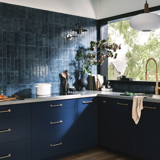Clients often ask me for recommendations on prosumer (professional + consumer) cameras. The truth is, though I keep myself updated on the latest professional photography technology, I haven’t stayed informed about some of the lower level camera models.
When I head out on a photoshoot, I almost always pack a bag full of Canon primes and the latest 5D Mark III so I’m as prepared as I can possibly be. Lately, though, I’ve had a change of heart.
Occasionally I found myself driving around and noticing great shots I wanted to capture, but I wasn’t able to because I didn’t have a camera on hand. I kept telling myself that I could go grab a studio Canon and return for the shot, but when I did, the beautiful shot I’d seen before wasn’t quite the same. I was getting frustrated.
The Specs
I needed a compact camera I could carry with me everywhere while - most importantly - capturing high-quality images like one of our studio’s DSLRs. There had to be something on the market to meet my needs.
After doing some digging, I was pleasantly surprised with the cameras available. I read numerous reviews, blog posts (two of the best blogs I found were Digital Photography Review and Steve Huff Photo, so check those out) and discussed the options with my peers. I narrowed it down to two choices: the Sony Cyber-shot RX1 and the Fujifilm X-Pro1.
Now, both of these cameras have some pretty amazing features, but I was looking for the following specifics:
-
Full manual controls with the option to go aperture or shutter priority
-
Great color processing and dynamic range within sensor
-
Decent file size (comparable to Canon 1ds Mark III’s 21 mega pixel)
-
Sharp, fast, and beautiful lens(es)
-
Great low light capabilities (low noise at high ISOs)
-
Competent autofocusing (fast; multiple autofocus points)
So let’s get to the good stuff: the battle. The brawl. The brouhaha. Which camera will be the victor? Let’s take a look.
The Showdown: Sony Cyber-shot RX1 vs. FUJIFILM X-Pro1
Sony Cyber-shot RX1
Pricetag: $2,800
Pros:
-
A huge full frame sensor that clocked in at 24(!) mega pixels.
-
Comes with an attached Zeiss prime f/2 35mm.
-
Color and light quality are indeed phenomenal.
-
Super compact; fits easily into my pocket.
-
Great low light quality.
Cons:
-
Comes with an attached Zeiss prime f/2 35mm. (Yes, I know I mentioned this in the list of pros, too. This is a great lens, but for $2,800, I’d like the ability to change lenses.)
-
Super compact; fits easily into my pocket (great for mobility, but the camera is so small that it doesn't even feel like a camera. It feels more like a little point and shoot with a big lens. A traditional shooter like me struggles to hold it like an actual camera).
-
No viewfinder! Again, traditional shooters will struggle with this concept. If the size didn't make it feel less like a camera, framing shots using only an LCD will.
-
Its $2,800! That’s an awful lot of money to drop on a camera that has some pretty serious faults. That amount of money could get you an actual Canon professional tier DSLR. Even though it's a full frame sensor and a huge file size, that’s just too expensive.
Fujifilm X-Pro1
Pricetag: $1,399 + $599ish for each lens
Pros:
-
Good size sensor at 16mp, though not quite full frame.
-
Very, very nice color and light quality. Leica quality.
-
Excellent quality Fujinon lenses. The 50mm equivalent can shoot as wide open as an f/1.4.
-
Tons of autofocus points to choose from, and they are easily and quickly accessible while shooting.
-
A nice, sturdy build that feels like a camera.
-
Viewfinder has two modes: optical (rangefinder) and electronic (seeing exactly what the lens sees). It’s very simple to toggle between the two.
-
Very little (if any) noise in low light situations and high ISOs.
-
It fits within my tax return funding budget! ;)
Cons:
-
Not full frame, but the file size is fine (unless you want to shoot trade shows or billboards) but even in those instances, the file size would probably be okay.
- The optical finder is awful; the autofocus points don't line up. A surprising flaw on an otherwise great little camera.
- Doesn’t fit in my pocket, but it’s certainly small enough to carry with you at all times in a small bag.
- Autofocus is just slow enough to make it quite frustrating to shoot quickly moving objects, like unpredictable children running in all directions.
The Victor
So which one came out on top? Which prosumer camera is the reigning champion?
In my opinion, if you've got some tax return money burning a hole in your pocket and you love taking beautiful photos, you should definitely check out the Fujifilm X-Pro1. Even though the optical finder was less than stellar, all the other features more than made up for it. The Fujifilm X-Pro1 fit all my needs and - bonus! - made a lot of my fellow photographers very jealous.
Which compact prosumer cameras do you prefer? Leave your recommendations in the comments below. We’d love to hear ‘em!



